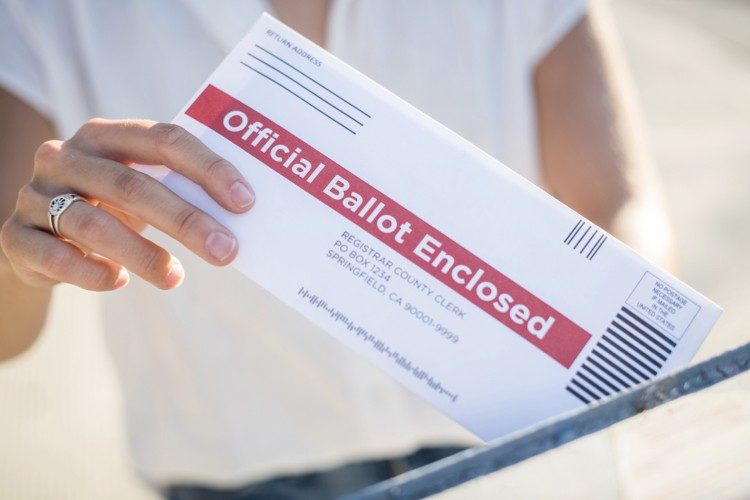
If the saying “as California goes, there goes the nation” is true, then we are in serious trouble. Election Integrity Project California (EIPCa), a non-partisan group working to monitor the election process, posted a press release on October 19 concerning the state of California mailing out 440,000 “Questionable” ballots for this upcoming election. That is but one of a series of questionable moves the state is making this year.
According to EIPCa: “420,000 ballots for California’s November election were mailed to registered voters who have probably moved or died, while more than one ballot was sent to 20,000 more.”
“EIPCa sent the findings — based on its analysis of the State’s voter registration database of August 18, 2020 — to Secretary of State Alex Padilla on October 17. They call into question why almost 420,000 ballots were mailed to those who have likely moved or died and why two to four ballots were mailed to each of 20,000 voters. EIPCa also published the number of questionable mail ballots in each congressional, senate, and assembly district and county.”
Questionable registrations of those mailed ballots include:
- LA Co. Male, born 1920, last voted 2004, died out of state in 2010, per SSDI.
- Placer Co. female, born 1931, died 2015 at her voter registration address. Matches CA death record.
- LA Co. female, born 1896, died in 1993 in LA County. Matches CA death record.
- Monterey Co., male, born 1914, registered in 1936, last voted 2004. Likely deceased.
- Fresno Co., male, born 1936, registered in 1952, last voted 1998, likely moved or died.
- Alameda Co. female with three Active registrations-same name, birthdate, address, phone, and email. She was registered three times in 2020 using three registration methods and mailed three ballots.
- LA Co. male with two Active registrations-same name, birthdate, differing addresses but same phone and email. Has been double registered since 2016 and mailed two ballots.
A Los Angeles CBS TV station reached out to several voters and found:
- One ballot was sent to Margaret Richards in Sherman Oaks, but she had moved to Tennessee 16 years ago, causing Richards to question the election’s integrity. “It just is regrettable,” she said. “Think about how many people who have moved, and the same thing is happening over and over. How do you trust the system?”
- Richards isn’t the only one. Monrovia resident Pam Harnden said she received ballots for the people she bought the house from, even though they moved to Texas 15 years ago. “Whenever there’s an election of some sort, I get all the paperwork,” she said. “It’s a shame because it’s, what, going on 15 years, and they haven’t taken these people off the voter rolls?”
- The LA County Registrar said that “a voter record is made inactive only when mail sent to the voter is returned undeliverable from the post office or through notification of a change of address. If you get a ballot in the mail not addressed to you, mark it return to sender. Voter no longer lives there.” Harnden said she has done that every year, and she still receives them. “Like a bad penny,” she said.
After assuring California voters of the state ballot system’s integrity, Secretary of State Alex Padilla then released 14 new regulations concerning mail-in ballots and signature verification five days after the five-day public comment period had passed. These regulations include:
- “Regulation 20960(j) makes it very unlikely that any envelope signature will be rejected. Without any basis in California law, the Regulation imposes a standard until now occurring only in criminal procedures, requiring that two additional election officials agree, beyond a reasonable doubt, that the signatures do not match.”
- Regulations 20991(b)(9) and (10) eliminates the requirement for voters to use a “genuine ballot, but can just mark up a sample ballot, or scrawl votes on a “letter or note.” A diligent fraudster can stuff one barcoded ballot return envelope with as many notecard ballots as will fit and scribble names and signatures of additional voters somewhere on the envelope. [20991(b)(11)]. Because signature verification has been weakened, such fraud could well succeed.”
- “According to the new “Election Observations Rights and Responsibilities,“ mandate, observers may be restricted to a “designated area.” County officials are encouraged to use discretion to determine how far back observers have to stand. Remote observation from separate rooms or even from home is now a condoned and sanctioned obstacle to public oversight under the Election Observer Panel Plan.”
Situations like an arsonist torching a ballot box in Baldwin Park that damaged around one-hundred ballots have caused the California Republicans to distribute ballot boxes at local churches and gun shops.
The number of illegal and questionable actions in this election has made California’s election this year about as honest as Venezuela’s. When taken into account with the number of other voter problems in states such as Colorado, Pennsylvania, and North Carolina, it is easy to imagine that the election’s fate could rest in the Supreme Court’s hands.




